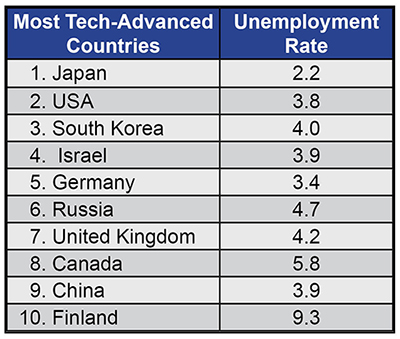A number of newspapers recently published an op-ed I wrote about liberals’ newest public policy fad: universal basic income (UBI).
Under UBI the government provides everyone, from the richest to the poorest, with a monthly check. Liberals see it as a way to reduce poverty and income inequality—and maybe “buy” some votes. But they are also warning that a coming technology explosion will push so many people out of work that UBI will become necessary.
In other words, more technology means more unemployment.
The proposition sounds reasonable, since technological innovation does eliminate some human-preformed jobs. The problem with the theory is that all the evidence points in the other direction—technological innovation creates jobs, albeit different ones from those being eliminated.
We live in the most technologically advanced era in history. If the technology-destroys-jobs theory were correct, you would expect the most technologically advanced countries to face high unemployment levels; but just the opposite is the case. Indeed, in the U.S. there are thousands of jobs that are going unfilled.
In the chart below, we list in oder one group’s assessment of the top 10 most technologically advanced countries. The rankings will vary slightly on different lists. For example, on many lists the U.S. is first. And some lists will include a few different countries.
Next to the country we list its current unemployment rate. As you can see, there is no correlation between technology adoption and unemployment. In fact, many of the most technologically advanced countries are close to historic lows in unemployment, and well below what economists consider a “full employment” economy.

Of course, lots of factors affect unemployment rates, especially government policies.
For example, when politicians push the minimum wage higher or force employers to provide very expensive health insurance (i.e., Obamacare), that can lead to employers replacing employees with technology. But those lost jobs are the result of government mandates, not technology.
Indeed, we’d suggest that government is almost always the real culprit behind high unemployment. And the only cure for that problem isn’t universal basic income, but voters who elect limited-government candidates.
